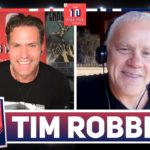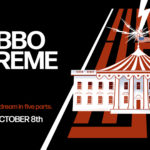
Tim Robbins at the Premiere of HBO’s ‘The Brink” on June 8, 2015 in Los Angeles, CA/Image by Joe Seer
Robbins’ film work, however, is what catapulted him into becoming a major movie star, beginning with his role as Ebby Calvin “Nuke” LaLoosh in “Bull Durham,” in which he plays a rookie baseball player being “trained” by Susan Sarandon. One of his most memorable and multiple award-winning roles was in Mystic River. Robbins delivered another unforgettable performance in Shawshank Redemption. Some of Robbins’ other films include “War of the Worlds,” “Green Lantern,” “Catch a Fire,” “Jacob’s Ladder,” “Top Gun,” and “The Player,” for which he received the Best Actor Academy Award. Equally at home behind the camera, Robbins directed the riveting “Dead Man Walking” and received a nomination for Best Director. Robbins is Founder and Artistic Director of The Actors’ Gang, formed thirty-five years ago. He has directed multiple provocative productions for The Actors Gang, many of which have a political bent to their stories.
Robbins recently sat down with your reporter for an exclusive two-part interview; this has been edited for content and continuity for print purposes.
Here’s a small world story for you: When I was in Washington Irving High School in New York City, our brother school was Stuyvesant High where you attended. Is that where your love of theater began?
Tim Robbins: No, it had happened before that. My sisters were involved with theater so I would go watch their plays. I was put into one of their plays, I believe when I was 12, so that was my first play. I did a street theater show called “Undercover Cop,” followed by a number of plays that were social satires. We would pack a truck with 4 x 8 platforms on legs. We’d set up a stage – put the backdrop up, and costumes would be in the truck, where we would change. Musicians would be there. They would play music, the crowd would gather, which usually was around 200-300 people, and we would perform our plays on the street. It was a great way to learn because it takes a lot of projection and presence to compete with a New York City street, with the sirens, the honking horns, and the junkies coming up on the stage. (Laughs)

Susan Sarandon and Tim Robbins in Tim’s favorite film, “Bull Durham, because that’s where I met Susan.”
You mentioned that “Bull Durham” is your favorite film? Why?
Robbins: It’s where I met Susan [Sarandon] and a family came out of that for me. That was pretty special. Not only did that happen, but I was also able for the first time in my life to fulfill a fantasy, which was to be a professional baseball player. (Laughs)
How does your success as an actor inform your love of theater?
Robbins: I wanted to be a theater director and that’s why I went to college. I had always envisioned myself going back to New York and becoming a director. Then I got lucky. I got an agent out of a competition I did at UCLA and within a year I was working as a professional actor and making pretty good money. I produced my first play “Ube the King” using my earnings from a gig.
By the time I got around to my second play, I had started earning money in television and movies so I realized wow; this is a great way to fund theatre. So, for the first ten years of The Actors’ Gang, I was very much in the discipline of making sure that I would save time to do one play a year. I would tell my agents that I was going to do a play and would be out of commission for three months so please don’t send me on auditions. They would say, “Are you crazy? You’re not getting paid to do theater. We’re building a career for you and things are going well.” I would tell them this is as important – maybe more important than doing a walk-on in “Hardcastle & McCormick.” In my mind, one was to make money and one was to make art. I was very clear. Even when I was getting better and better roles, I made sure to still make time for theater. When I was cast in “Bull Durham,” I was also producing “Carnage, A Comedy,” which we opened at the Tiffany Theatre in Hollywood. So I told my agents that I agreed to do the film but would need three months off after that.
Do you find theater and film mutually exclusive?
Robbins: My different careers have always been partners and I still get a lot of joy out of acting in movies and I love directing movies. But, my heart is always here [at the The Actors’ Gang] and always has been. When you’re waiting on financing for a film, and you realize you are subject to the whims of financiers, I can just come in here and say, “Hey, let’s workshop this. I’m kind of interested in doing this play. Let’s do some scenes and see how it looks.”
What is your biggest fear when you’re starting a new project with your actors?
Robbins: (Long Pause) I don’t operate in fear. I think it’s good when you’re trying to create something that you have doubts, and challenge yourself to be better. Too much confidence can be an enemy and certainly arrogance is not a fun thing to deal with. I try to enter into a relationship with my actors as a collaborator rather than a boss because their work, their talent, and their commitment to emotions ultimately will reveal a truth, if there is a truth to be revealed. Also, their best efforts will reveal the lack of truth and where there’s something wrong. It’s a great opportunity for a writer/director to have a group of actors to be able to make you realize what works or conversely, what doesn’t work, giving you the opportunity to change it.

Tim’s dad Gil Robbins, was a member of the popular folk group called The Highwaymen.
Can you talk about your family? Were they show biz folks?
Robbins: My dad was a folksinger and my mom was a publishing executive, but she also sang. She was a music major in college and was in the marching band, which is how they met at UCLA. She played the flute and my dad was the drum major. He had some success with a group called The Highwaymen. Then he started doing a solo act and ran a club called “The Gaslight Cafe” in Greenwich Village. She was a member of the New York Chorale Society of which she was president. She sang regularly with them and would do shows at Carnegie Hall. It was a very creative household and there was always music playing.

Robbins: “I wanted to attend Performing Arts High School but my dad wouldn’t let me apply. He said that there’s nothing less interesting than an uneducated actor.”
They didn’t encourage us to be actors; in fact, they encouraged us not to be actors because my dad knew how difficult it was. I wanted to attend Performing Arts High School but he wouldn’t let me apply. He said that there’s nothing less interesting than an uneducated actor. So that’s why I went to Stuyvesant High School even though it was over my head because I was a Catholic school kid. I took the test to get in and got in, but in my freshman year, I was a C-minus student. I was a bit over my head, as Catholic school had no science. It was “God made it” and that’s it! We didn’t have any kind of pre-algebra or any kind introduction to concepts.
Are you a practicing Catholic?
Robbins: No, I’m not. But, I’m respectful of that religion.
What about your family?
Robbins: (Laughs) They’re all in the business. My son is a musician and a great songwriter and my grandson is directing and my daughter writes an amazing blog on motherhood.

Tim Robbins, Sydney Pollack and director Robert Altman rehearse a scene from “The Player.” Robbins: “I just loved him because he empowered me with the idea that Bob Altman and I were collaborating on this project.”
You’ve worked with some of the most famous people in film. Do you have one experience that stands out for you?
Robbins: I would say working with Robert Altman on “The Player” was a dream come true. I won Best Actor at Cannes as well as a Golden Globe. It was right before I directed my first film so it was like having an opportunity to attend film school with Altman. We collaborated. We wrote together. He respected me, which was an odd thing because I was a young man and had idolized him. I just loved him because he empowered me with the idea that me and Bob Altman were collaborating on this project. At one point he said that a producer might try to come in and try to bully his way or try to cut a scene. We said that we should make a pact that if they start trying to fu## with us, I walk and if I walk, you walk. I said, “I’m in!” He was a genius in so many ways. His films are not like any other films. When I saw “Nashville,” I was in high school and it was the first time I watched a movie and thought wow. You can do that in film?

Susan Sarandon and Tim Robbins with family at the October, 2008 Hollywood Walk of Fame Ceremony honoring Robbins/Image by S_Bukley.
It seems that Hollywood marriages break up at a faster rate than others. Can you talk about that?
Robbins: I can’t talk about a Hollywood marriage. Susan and I never had a Hollywood marriage. We lived in New York, number one, and number two – one of the reasons we stayed together as long as we did was because we kind of didn’t talk about this stuff. You know, broad general ideas about what relationships are or how that is through the prism of our relationship. (long pause) It’s an area that I’ve always refused to talk about because personally I don’t think it’s that interesting and I also just don’t think I know anything insightful about this subject.
Poundridge, New York came up in my research. Did you live there with your parents?
Robbins: No. I grew up in Greenwich Village with my parents in a one-bedroom railroad flat with four kids. I bought a house in Poundridge somewhere around 1990. I still own a house there with Susan.
Isn’t that Republican territory?
Robbins: It’s partly Republican. They wouldn’t let me join the golf club. I just wanted a place to play golf as I had a brief interest in golf. I couldn’t become a member because I was not married. I was living in sin. (Laughs) But you could be married and divorced several times and still be eligible for membership. (Laughs)


